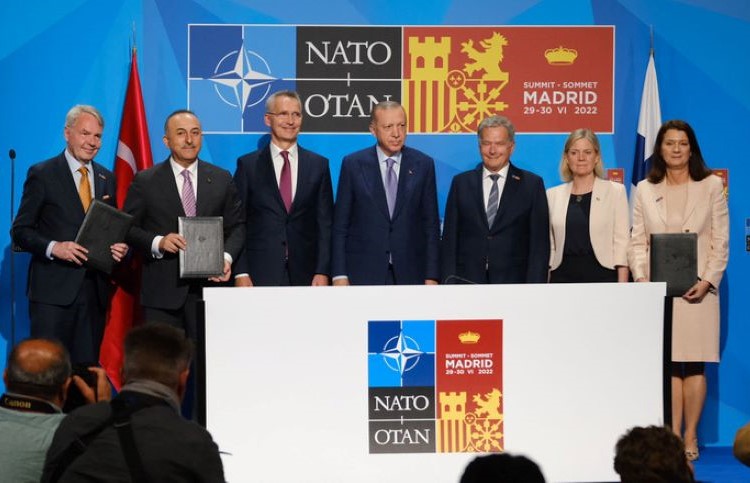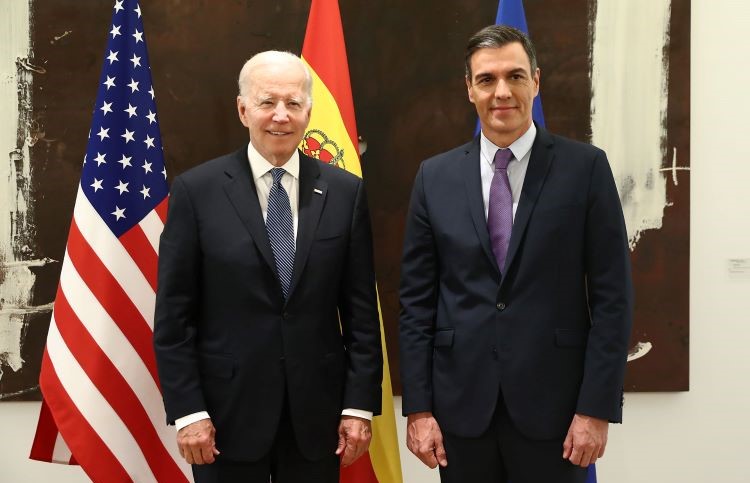The Diplomat
The Madrid Summit has achieved its first major success just a day before it began: Turkey announced yesterday that it had reached an agreement with Finland and Sweden to withdraw its veto on the accession of these two countries to the Alliance, after a long meeting in which NATO Secretary General Jens Stoltenberg participated as mediator.
Turkish President Recep Tayyip Erdogan, Swedish Prime Minister Magdalena Andersson, Finnish President Saulio Niinisto and Jens Stoltenberg himself held a four-hour meeting in Madrid yesterday at the end of which the parties signed a joint memorandum containing Ankara’s main demands for the withdrawal of its veto, related to the extradition of Kurdish militants of the Kurdistan Workers’ Party (PKK) and the People’s Protection Units (YPG). With this agreement, Finland and Sweden will definitively abandon their traditional neutrality to become the 31st and 32nd partners of the Alliance, whose accession requires the unanimous support of all 30 member states.
Apart from his participation in this diplomatic success, Jens Stoltenberg yesterday maintained an intense pre-summit activity that included his participation in the NATO Public Forum, the first High-Level Dialogue on Climate Change and Security, in which he stated that the Alliance’s new Strategic Concept to be approved at the Madrid Summit establishes that climate change is a “defining challenge of our time”.
The Secretary General was also received at midday by the President of the Government, Pedro Sánchez, with whom he visited the NATO Summit facilities at the IFEMA fairgrounds, a space of more than 54,000 square meters which, from today, will be occupied by nearly 5,000 people, including official delegations, journalists, security and support staff. According to Moncloa, the space is adapted to the strict security requirements established by NATO, such as the Atlantic Council room, where Allied meetings will be held in the utmost privacy. In addition, the venue can accommodate 1,500 journalists.
In a statement offered to the media at the end of the visit, the President of the Government affirmed that “the Madrid Summit will be one of the most transcendental in the history of the Alliance, because of the difficult strategic context in which it will be held, and because of the important decisions that will be taken for the future of the Alliance”. According to Sánchez, the invasion of Ukraine by Russia “is the greatest security challenge that the Atlantic Alliance, together with the EU, has had to face since the fall of the Berlin Wall and the disappearance of the Soviet Union”. Therefore, the allies will lay in Madrid “the foundations for the next decade of the structures that will allow us to guarantee the security of Europe and the strength of the transatlantic link, with the intention of promoting peace in the world.” “The success of the Summit is a success for all Spaniards. With it, Spain’s prestige, and its image in the eyes of our partners and allies, will be reinforced,” he added.
Speech by the King at the dinner
At the gala dinner hosted by the King and Queen at the Royal Palace last night for the Summit’s heads of state and government, King Felipe argued that pessimism should not be an option at a time when the world faces old threats, such as Russia, combined with new ones, urging NATO leaders to look to the future with determination to provide their citizens with the security and peace they yearn for.
At the dinner toast, the King recalled that at the previous summit in Madrid in 1997, times of intense change and reshaping were under way and the Alliance took “the first steps” in its enlargement to include Eastern European countries in the hope of leaving the Cold War behind.
He stressed that, at that time, “a spirit of optimism” prevailed after the fall of the Berlin Wall, but now “the geostrategic reality has changed radically”, he acknowledged, adding that “we face the merging of both old and new threats”, alluding to Russia in the first instance.
The Summit
The Summit will be attended by the 30 NATO allies and eight invited countries (Australia, Republic of Korea, New Zealand, Japan, Ukraine and Georgia, and the two candidates to join the Alliance: Sweden and Finland), as well as the President of the European Council, Charles Michel, and the President of the European Commission, Ursula von der Leyen. Seven other countries will participate in events on the margins of the Summit, including the heads of state or government of the four EU countries that are not NATO Allies, who are invited to the Euro-Atlantic dinner hosted tonight by the Prime Minister at the Prado Museum to discuss NATO-EU relations. In addition, Mauritania, Jordan and Bosnia and Herzegovina will attend dinners organized at ministerial level on the same day.
During the Summit, organized around three working sessions, the Strategic Concept and other important decisions for the Alliance will be adopted. They will also discuss Russia’s war against Ukraine – a session in which Ukraine’s President Volodymir Zelenski will participate by videoconference – and the impact on the most exposed countries, such as Georgia, whose Prime Minister will also attend the Summit. The leaders will also discuss the challenges and threats on the southern flank, such as terrorism and food security, and other issues will be addressed, such as the aforementioned accession of Sweden and Finland and relations with the European Union and the Indo-Pacific partners: South Korea, Australia and New Zealand.
Foreign dinner menu with winks to Ukraine
Last night, the foreign ministers and defence ministers of the 30 NATO partner countries, along with the European Union, South Korea, Finland and Sweden, shared a dinner with a wink to Ukrainian cuisine.
The dinner was held at the Palacio de Santa Cruz, the headquarters of the Spanish Foreign Ministry, and was served by chef José Andrés, with a menu prepared by three great Spanish chefs, which included a starter called ‘ensaladilla Kiev’, among other dishes.
The Foreign Affairs Minister, José Manuel Albares, referred to the allies’ support for Ukraine in his speech, while the Defence Minister, Margarita Robles, stressed the importance of the Strategic Concept to be approved at the Summit.







